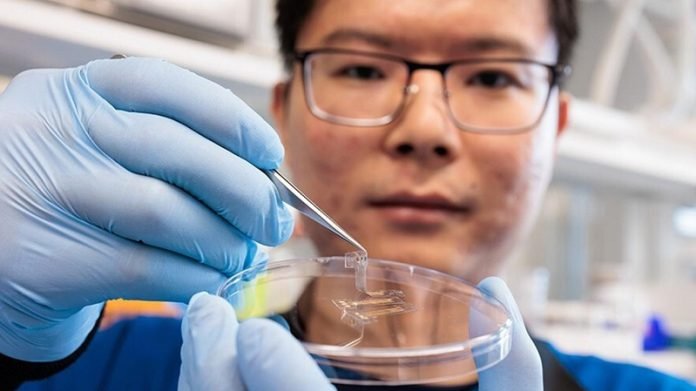
Imagine a band-aid that can stick to your heart and tell doctors how well it’s working.
Sounds like something out of a science fiction movie, right?
But researchers at the University of Chicago have just made it a reality.
They’ve created a new type of sensor that can stick to your organs like a piece of tape, without any need for stitches or glue. This could revolutionize the way doctors monitor your health from the inside.
Why Is This a Big Deal?
Currently, sensors that are placed inside the body usually need to be stitched or glued on. But these methods have a big downside: they don’t stick very well, especially to organs that are always moving and wet, like the heart.
This makes it hard for doctors to get good, steady data. The new sticky sensor fixes this problem by adhering directly to the organ’s surface, giving much clearer and consistent information.
How Does It Work?
The key to this new sensor is a special material that loves water. When this material comes in contact with the wet surface of an organ, it soaks up the moisture and sticks tightly.
This “sticky” material is combined with another that can pick up electrical signals from the organ. The result is a sensor that not only sticks well but also sends accurate data to doctors.
Sihong Wang, the head researcher, said, “This is the first sensor that sticks on its own, without needing stitches or glue. This opens up all kinds of new possibilities for keeping track of our health.”
Super Useful for the Heart and More
To see how well the sensor worked, the team tested it on a heart. They found that just a little bit of gentle pressure for less than a minute was enough to stick it on securely. The sensor stayed in place and provided much better data than the old-style sensors that had to be stapled or glued.
But the heart is just the beginning. This sticky sensor could be used on other organs too, and it could measure all sorts of things besides electrical activity. For example, it could monitor the levels of different chemicals in the body, helping doctors to understand more about your health.
What’s Next?
The team is now working on making the sensor even better. They want to make sure it can be easily removed when needed and that it can stay in the body for a long time without causing problems.
“The goal is to make sensors that can stay put and keep sending data, no matter how long they need to be there,” said Wang.
In the future, this sticky sensor technology could make it much easier to monitor health conditions and could even help doctors spot problems before they become serious.
It’s a major step forward in healthcare technology, bringing us closer to a world where keeping an eye on your internal health could be as simple as sticking on a band-aid.
Citation: “Bioadhesive polymer semiconductors and transistors for intimate biointerfaces,” Li et al, Science, August 10, 2023. DOI: 10.1126/science.adg8758
Follow us on Twitter for more articles about this topic.
Source: University of Chicago.



